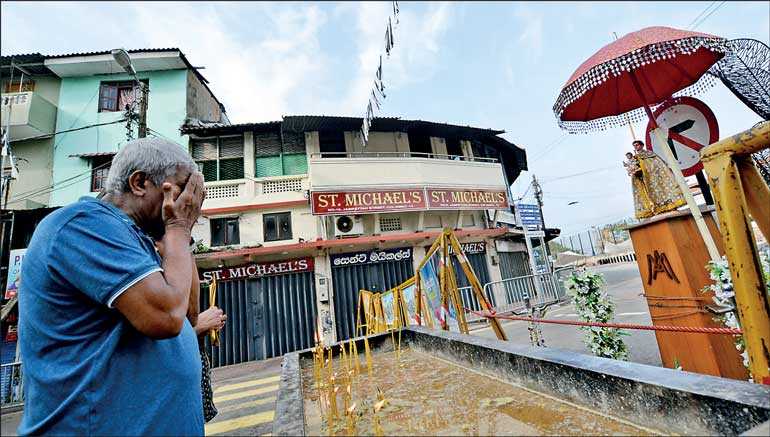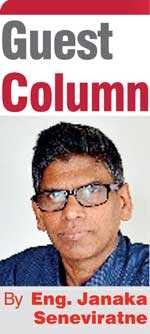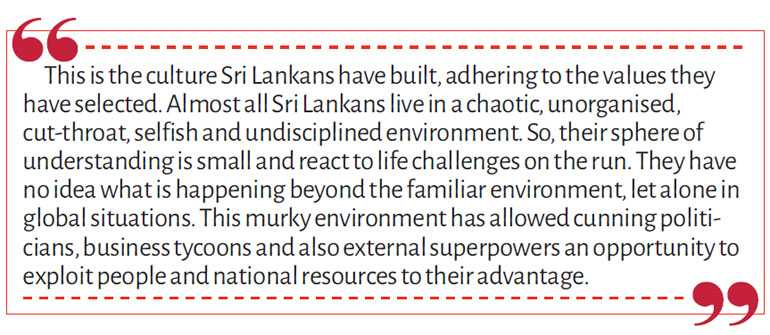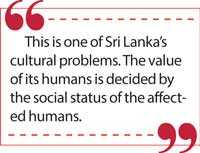Saturday Feb 21, 2026
Saturday Feb 21, 2026
Wednesday, 8 May 2019 00:00 - - {{hitsCtrl.values.hits}}

Easter Sunday 21 April was a fateful day for Sri Lanka. It was the day that animalistic instincts of a few individuals conquered the rights of scores of humans who wanted to live peacefully. I am not qualified to analyse the ideologies behind those evil individuals. I can only say that their actions defied decent human behaviour and acceptable social values. 
Scores of innocent lives were lost, in addition to property damage and damage to the tourism industry reputation. It will take many years to restore normalcy to public life and public confidence that the Government has the capability to ensure safe living conditions and ensure such a disaster will not be repeated in this island.
I simply cannot imagine the pain and suffering going through the minds of people whose loved ones gone forever. The whole island is weeping and I am weeping with them. At the same time, I am angry with people who failed to prevent such a disaster and also failed to manage its after-effects. It was a classic example of disaster mismanagement.
Disaster management and information management
Any country and person must be ready to respond to a disaster. It is a fact of life. The disaster could be a natural or a manmade. As a professional who keeps a keen eye on Sri Lankan public sector activities, I know that disaster management was one of the key areas the Government was working on. However, for some time, I was not entirely convinced that competent independent professionals were there to develop a comprehensive disaster management plan. I even know some advisors who were appointed for political reasons to handle such planning while overlooking known experts who were serving foreign governments to develop Asian regional disaster management plans.
If the Government claims that such a plan was there, the first action that springs from should have been the announcement of a single spokesperson representing the Government to deal with information for the public and local and foreign news agencies. In the Disaster Management Plan, there should have been a mechanism to collect data and facts, verify the confidence level of data before converting and releasing it as filtered information. It should have been done such a way that everyone had the confidence on the accuracy and timeliness of information available. There should have been a continuous 24-hour news briefing by the Government through all digital media including social media.

What the Government did was the ban the use of social media with the intention to curb the spread of misinformation, due to fearing communal violence. It did not prevent the spread of fake news. I consistently followed Sri Lankan social media from Australia and the information flow never ceased. This is an era of digital technology. One cannot close all digital outlets and technically savvy people can find ways. Does the Government believe that the radical international organisations behind this attack could be stopped from distributing fake news locally and internationally by deploying this amateur action? The proper action should have been to use powerful social media tools effectively to distribute true facts and figures.
It is true that this information mismanagement had indirect public benefits. It exposed how incompetent the public sector professionals were and how immature and uneducated many of political players were. Some politicians behaved like frogs in a well, thinking this is the universe. One person tried to link the disaster as a retaliation to Christchurch mosque massacre in New Zealand. The Prime Minister of New Zealand, who is globally known as a charismatic leader, immediately responded that there was no information from her intelligence services about such a link. Then, NZ Deputy Prime Minster waited some time until all the facts were collected and analysed to announce with certainty that there was no such link and this kind of attack needed long-term planning well before the NZ disaster. At the same time, he said that it was a cheap shot and that NZ would not remain silent allowing others to misuse it to cover up their own deficiencies. Sri Lankans have every right to be ashamed of the immature performance of our own officials and politicians. 
The Sri Lankan Prime Minister told a foreign correspondent that Sri Lanka has no legal avenues to take action against foreign-trained terrorists when they returned to the country after serving foreign terrorist movements. I don’t know whether this is the correct legal situation. If it is the case, we must change it. My issue is the casual manner and expressions the Prime Minister used to make that statement. He should have mentioned that the current law prevents us taking legal action, but that Sri Lankan authorities would interview them upon entry and establish close surveillance on such people, preventing them from carrying out terrorist activities on Sri Lankan soil. Even my legal knowledge is enough to give that answer. This shows how much our political leaders are out of touch with societal needs, common sense and diplomacy. Furthermore, some high-ranking officials and politicians tried to justify the inaction in response to intelligence reports pre-warning of the imminent disaster by citing the number of casualties they predicted as relative impacts in case of such an event. How could a decent human being put a relative price to even slight danger to another human being? This is the difference between the values of the Western world and South East Asian world. Also, one politician compared the number of lives lost by this disaster with the previous disasters like 9/11 in the USA claiming this was a relatively small event.
This is one of Sri Lanka’s cultural problems. The value of its humans is decided by the social status of the affected humans.
The classic example to explain this situation is the common occurrence of flooding and landslides in Sri Lanka.
Landslides usually occur near villages surrounding mountainous terrains. Usually, poor people build their houses (legally or illegally) in such locations due to non-availability of suitable alternative land. When these villagers were buried under the rubble due to landslides, the disaster was just reported as a sensational news item. Government politicians and authorities put the incident to the “Act of God” account and moved on because the affected were downtrodden poor people. This was an action taken repeatedly by successive governments. These poor souls would be lost on an almost annual basis and nothing significant happened in response except preparing landslide hazard maps and installing a few monitoring equipment to detect earth movement for some sites, as far as I know. The Urban Development Authority and National Building and Research Organisation should have enforced restrictions on building houses within the zones of landslide prone areas and a Development Compliance Code should have been developed many years ago. To the credit of NBRO, now they have initiated a development of a Resilient Code.
Flooding in remote areas was also treated same way. During the early nineties, when I was working in the public sector, a significant area of Colombo elite suburbs was flooded due to the structural failure and blockage of underground storm-water pipe network. This blockage happened due to the age, poor maintenance of the pipe network built by British Engineers over 100 years ago as well as due to the poor land use practices and approval process, allowing people to build houses blocking storm-water paths. On this particular occasion, basements of many houses flooded and the personal library of one high ranking statesman was also perished. Senior management of my organisation sprang into action as the Government Ministers started calling them on a daily basis, only because it was part of their socio-economic class that was affected. This resulted in securing foreign aid for replacing and improving the Colombo City underground storm-water management system. The rest is history. This is how humans are valued in Sri Lanka.
In Australia, the politicians responded to the Sri Lankan disaster very professionally and emphatically. It should be noted only two Australian citizens were killed, both of whom were dual citizens. The whole nation felt sad about this loss. The Prime Minister and the Opposition Leader attributed the highest possible value to the two lives lost. They had clear, concise messages to the whole of Australia regarding the Sri Lankan disaster. First of all, both of them unequivocally condemned the attack and openly expressed that Australia was with Sri Lanka at this difficult time. They gave updated information daily twice via national television. Until verifying facts, they did not jump into any conclusions or figures. They were the highest level and only official spokespersons for the entire nation. Both of them did not misuse this incident for their political purposes, although the Australian national election is to be held in May. Their communication strategy was very organised and provided information to the public in a very professional manner. Apparently, the Prime Minister of Australia even personally contacted the family members of the affected families to console them, promising any assistance. It was reported in social media that none of the local politicians had the decency to contact them until Australian politicians did so.
As a person living overseas, I came to know about the serial bomb blasts through online news feeds and Australian television news feeds. I sadly witnessed how Sri Lankan officials and politicians responded and how we became a laughing stock to foreign observers. Some of the overseas analysts were amazed by the insensitivity and the lack of empathy displayed by local politicians and officials when describing the impact of the disaster on people and the country. I was really ashamed as a Sri Lankan to witness the uncivil behaviour of my own countrymen.
Reaction vs. response
When a disaster happens, the Government machinery must respond, not react. There is a difference between response and reaction. When one reacts, there is no planning and rational thinking behind the actions. Usually animals react when facing danger. Of course, people’s own animalistic instincts in the face of danger lead to adverse reactions. That is why when a vehicle is driven towards us, we tend to run away without thinking. However, if we see a vehicle at a distance, we respond by walking away from it by assessing the distance and speed of the vehicle.
We do not expect an organised Government to react. It must carefully assess the situation and take methodical action. Foreign news channels highlighted the in-fighting between the top-level Sri Lankan politicians and the dysfunctional government. In the aftermath of the disaster, the blame game was highlighted as an attempt to cover up the total failure of all politicians and officials in fulfilling their responsibilities. In my view, the majority of society were also a part of the problem, even while also being the victims of the situation. They spread sensitive information unnecessarily via social media, compromising the efforts of security forces to catch the people responsible.
This is all a result of our national cultural issues.
Brewing national culture
Often sociology experts talk about the culture of a nation in terms of norms, behaviours, beliefs, customs, and values shared by that society. Further, a culture is decorated by the traditions, religions, ethnic identities and historical accounts. To me, the most important element of the national culture is the values it adheres to. If the adhered social values are changed, the character of the other cultural elements is changed accordingly.
Let’s look at how the culture of the nation changed so rapidly during last fifty years.
Corruption was confined to local village level five decades ago and now this menace has invaded each and every layer of the hierarchical society. There are no role models any more for kids to look up to. Independent journalism was considered a highly respected profession back then; the majority of journalists have become mouthpieces of either influential business tycoons, NGOs or politicians. Sharing with neighbours and caring each other is a distant memory for the entire society. Majority of people have become so selfish and their only focus is to succeed in life by hook or crook. Both the poor and uneducated as well as the rich and educated are showing an equal lack of discipline, possibly for different personal reasons. When I was a kid, my parents never encouraged me to lie or to behave selfish manner. It was same with the parents of my friends. Parents encouraged us to share what we had with less fortunate ones. Now parents openly encourage kids to challenge teachers, tell blatant lies to secure placements at reputed schools and even encourage school kids not to answer academic questions in the class to avoid other classmates listening to the answers. Academic competition among school kids have gone to an insane level solely due to parental pressure. Vehicle drivers do not care about road signage, speed limits, pedestrian crossings and lane markings. People have no patience or discipline to stay in a line until served. People encroach on public land for personal use, block storm-water flow paths to secure their own properties, dispose of garbage in public spaces as they wish.
The powerful and influential being worshiped by the lesser is an accepted norm. Religious leaders form cults and people blindly worship them and listen to the sermons, without practicing basic principles of religion they follow. Modern day slavery is openly tolerated. Teaching was a noble profession back then. Now it is a business. The education system has been designed to produce people with theoretical knowledge, lacking social skills. They think paper qualifications are synonymous with expertise. The majority of educated people in various fields are too arrogant to accept that they have a long way to reach international standards. I often hear from them that “We are better than westerners”, “We know how to do so and so”. If these statements were true, I might not have had the chance to write this article on the failure of Government machinery in this kind of disaster. I am eagerly waiting for the day Sri Lanka will produce a Nobel Laureate solely through our national education system, without any input from a western education system, to accept for myself that Sri Lanka has finally produced an expert. I doubt I will live that long.
This is the culture Sri Lankans have built, adhering to the values they have selected. Almost all Sri Lankans live in a chaotic, unorganised, cut-throat, selfish and undisciplined environment. So, their sphere of understanding is small and react to life challenges on the run. They have no idea what is happening beyond the familiar environment, let alone in global situations. This murky environment has allowed cunning politicians, business tycoons and also external superpowers an opportunity to exploit people and national resources to their advantage. Only people who look from the outside can see this bigger picture and reality.
I am a Buddhist, but not one who goes to temple every week or listen to sermons. As I understand Buddhism, the Lord Buddha taught us to live in the ‘present’. Maybe other religions also have similar concepts. To me, the majority of Sri Lankans live either in the past or in the future mentally. This is why they are either thinking in a depressive way about past failures or chasing something futuristic. This causes them to be less vigilant at present about the changes happening in their living environment. Otherwise, they would have observed the unusual behaviour of the people moving around them, their risks and dangers. This is why I say, societal behaviour is also a part of the problem and only the society itself can rectify this, of course with the support of sane politicians and competent officials.
Propaganda war
Social media and on-line newspapers give me a clear idea how each stakeholder of this crisis plays the game. People are caught within this propaganda web unknowingly and the journalists also play a contributory role. Once, Winston Churchill said “A lie gets halfway around the world before the truth has a chance to get its pants on.” This is what is happening now in Sri Lanka. Fake news is being circulated at a rapid pace. There are so many stakeholders in this crisis. To name a few, the Government, opposition political parties, religious leaders, tri-security forces, police, government officials, local and foreign media personnel, business leaders, foreign superpowers, and local and international radical groups are there. This list is growing day by day. Each of stakeholders has own agenda and goals. At a given time, two stakeholders come to the centre stage and play against each other, while others work hard back stage. The general public are confused who is with whom and who is to be believed. Walter Lippmann once said “We must remember that in time of war what is said on the enemy’s side of the front is always propaganda, and what is said on our side of the front is truth and righteousness, the cause of humanity and a crusade for peace.” Hence, all are busy with developing propaganda according to their own agenda and long-term goals and claim only their side is telling the truth. Some blindly believe propaganda as Gospel truth. The art of the game is to tell half-truths. The politicians excel in this craft. US Senator Hiram Johnson said in 1917 that “The first casualty when war comes is Truth”. Winston Churchill said “In war time, truth is so precious that she should always be attended by a bodyguard of lies”.
Role of journalists
The current situation is a war against terror. The public have a right to know the truth but only to the extent that available information would not compromise the war effort. The best people to do this delicate job are the journalists. I don’t know whether there is a Code of Ethics (COE) available for the Sri Lankan journalists. If journalism is a profession, there should be a COE. In any COE, the most important message is the professionals’ duty to preserve the well-being of society when exercising duties. So the journalists must maintain balance in their approach on reporting the truth, to ensure the well-being of the wider society is not compromised by revealing sensitive information. The reporting content must be absolutely unbiased and true but the details should be limited for the greater benefit of the society. This does not mean that they should not record all details. Those classified information must be kept for revealing to the investigatory committees at the end of the effort for assessing the quality of the outcomes. At this point of time, it is about publishing information during disaster recovery and preventative planning phase. The primary aim of journalists should be the protecting people from ramifications. There is no need of Government-sponsored media censorship for this if journalists behave according to a COE. The professional journalists should take control of the situation and earn the confidence of public as unbiased and truth reporters. In the advent of social media, now, almost everyone in the society have become reporters and journalists. It is alarming to see how news content is distorted. A government cannot stop this and even it should not try to do so. What should happen is to develop a news source people can trust. After the mutual trust is built, the Government can educate the public on adverse impacts to their lives due to knee-jerk reaction to fake news.
(Eng. Janaka Seneviratne is a Chartered Professional Engineer, a Fellow and an International Professional Engineer of both the Institution of Engineers, Sri Lanka and Australia. He is contactable via [email protected].)